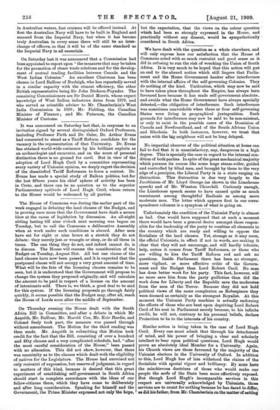We have dealt with the question as a whole elsewhere,
and will only express here our satisfaction that the House of Commons acted with so much restraint and good sense as it did in refusing to run the risk of wrecking the Union of South Africa. It is very much to be hoped that this action will put an end to the absurd notion which still lingers that Parlia- ment and the Home Government hanker after interference with the internal affairs of the self-governing Colonies. They do nothing of the kind. Unification, which may now be said to have taken place throughout the Empire, has always been favoured here because it has made self-government absolute, and avoids what the Home Government have always specially detested,—the obligation of interference. Such interference was sometimes unavoidable when three or four self-governing States were living in geographical juxtaposition. Such grounds for interference may now be said to be non-existent, or only to exist in the possible cases of the Dominion of Canada and Newfoundland, and of the South African Union and Rhodesia. In both instances, however, we trust that union with the big neighbour will not be long delayed.






































 Previous page
Previous page